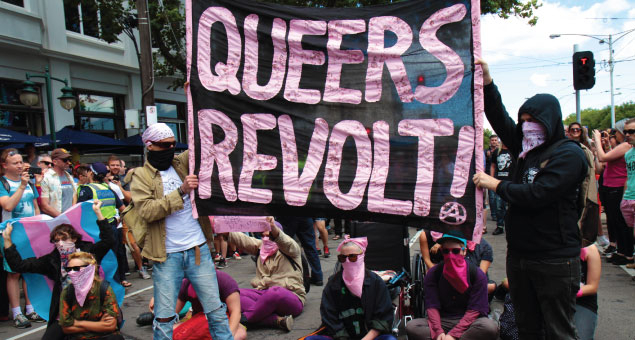In the lead up to Mardi Gras 2016, there have been two significant disruptions to Pride marches in Melbourne and Auckland – protests that discussed Indigenous incarceration and the complicity of Pride organisations in colonisation. Prison abolitionist group No Pride in Prisons condemned the Auckland Pride Board for electing to allow corrections officers and police to march alongside the community after long attempts at negotiations on the issue.
The group and their supporters protested at the march itself, citing the failure of corrections to protect transgender inmates from violence and the systemic criminalisation and over-representation of Maori in the justice system.
“The Auckland Pride Board may want to believe that there are no Māori queer people or that there are no queer or trans prisoners. That’s just not the case.”
At Melbourne’s Pride march in January, a group of anti-‘pink-washing’ protesters blocked the parade, sitting in front of the NAB float and not allowing it to pass. They defined pink-washing as “the use of support for mainstream ‘gay rights’ as a veil to excuse other behaviours,” by corporations such as NAB who have financial ties to the industries that support mandatory detention of asylum seekers.
They also noted the role police have played in homophobic and transphobic oppression in their critique of the inclusion of Victoria Police in the march, as well as the forced deportation of asylum seekers, and the role of multinational banks in contributing to the “ecocide of land and genocide of First Nations peoples.
In both cases, protesters were subjected to violence from onlookers and police. Melbourne sit-in participants were targeted with buckets of water and both verbal and physical abuse from people watching. Some marchers did not understand the protester’s signs and assumed the counter-rally was a homophobic demonstration. However, other members of the queer community encouraged violence against the group online with full knowledge of the aims of the protest. At the only Melbourne Pride March I’ve attended in 2011, I was also marching in a counter-protest block organised by local queer and trans activists. Our aim was to show solidarity to queer asylum seekers in Australia, following well-publicised cases in which asylum seekers were asked to give evidence of their sexualities and their relationships as part of their claims.
At the only Melbourne Pride March I’ve attended in 2011, I was also marching in a counter-protest block organised by local queer and trans activists. Our aim was to show solidarity to queer asylum seekers in Australia, following well-publicised cases in which asylum seekers were asked to give evidence of their sexualities and their relationships as part of their claims.

Source: SameSame
Knowledge of stereotypical western and white cultural references (such as Elton John, Madonna, the riot at Stonewall Inn in New York in 1969, and Oscar Wilde) were being used to determine how gay asylum seekers were, setting a white cultural standard as the gay norm and using queer markers to enforce the border. We were called too political and had other queer people attempt to stop us from marching - experiencing similar hostile sentiments showed at the counter-protest this year.
Both the Auckland and Melbourne counter-protests attempted to discuss the participation of gay Pride in the oppression of Indigenous peoples in Australia and Aotearoa respectively.
However unfortunately, the Melbourne-based group who led the disruption to Pride in St Kilda lacked the local level of engagement with Indigenous queer people that the Auckland protest demonstrated, beyond the broad mention of the “genocide of First Nations”.
They also made reference to Stonewall as a significant moment in queer and trans history. Moments in the history of queer resistance in the United States like the Stonewall riots are often referenced as the ancestors of current queer radicalism in Australia.
The borrowing of queer ancestry from Stonewall as a marker of ‘real’ gay culture and queer resistance is a similar assumption of shared US queer culture as the standards used by immigration and border control processes to determine the sexualities of asylum seekers claiming refuge. It establishes the idea that we all understand queerness and transness in the same way and has the potential to erase the possibility of creating solidarity with the local struggles Indigenous peoples are experiencing.
Indigenous queer and trans people have a historically violent and oppressive relationship with the justice system, have struggled to gain access to healthcare in both mainstream and Aboriginal health organisations.
Indigenous peoples in Australia have also been grappling with the influences of corporatisation in campaigns for our ‘equality’ such as Recognise.
New waves of radicalised queer politics are moving away from the global corporatisation of equality, and pressuring urban LGBTQI representative institutions such as Midsumma and Mardi Gras to rethink their allegiances to multinationals and the justice system.
Hopefully, there will also eventually be a push for non-Indigenous queer people to look away from moments of US queer history such as Stonewall for their inspiration, and to refocus their attention on the local struggles experienced by Indigenous queers themselves.

